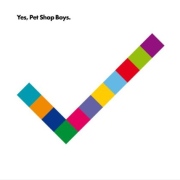- Pop/Electronic
- 2009
- Buy the CD
Reviewed by David Medsker
()
One wonders, though, if that has also caused some of the band’s problems Stateside. Their refusal to stand still has produced some brilliant pop, and shored up one of the most loyal fan bases in music. However, casual listeners of the band’s late-‘80s work were surely perplexed by the theatrical Nightlife (1999), the organic Release (2002), and the melodramatic Fundamental (2006). The poor bastards even made a Latin music album, but released it two years before Latin music became trendy (1996’s Bilingual, take a bow). As electronic pop goes, it’s arguably the best catalog there is, but a case could definitely be made for the band being its own worst enemy from time to time.
Which brings us to Yes, the band’s tenth album and fifth home in five albums (six, if you count their last album for EMI). LL Cool J implores us not to call this a comeback, since they’ve been here for years, but this is easily the band’s best album since 1993’s Very, a back-to-basics affair with their most consistent batch of songs and no-nonsense production. God love them for wanting to experiment with their sound, but God love them more for not forgetting what they do best.

The leadoff track and first single "Love Etc." is the best song they’ve sent to radio in ages (assuming they are still sending songs to radio), with a 6/8 beat – an oddity for dance pop, and they do it not once but twice – and an unforgettable chain gang back-and-forth vocal in the chorus that recalls "Domino Dancing." "Vulnerable" is vintage PSB minor-key pop (think "Rent," "The End of the World"), and "Beautiful People" is a definite first for the band, an exploration of Edwyn Collins/Frank Popp Ensenble-style swinger pop. Singer Neil Tennant keeps his vocals simple (the verses in "Vulnerable" feature roughly six or seven notes), and the production follows suit, a stark contrast to the kitchen-sink dynamics that dominated Nightlife and Fundamental.
Why on Earth, then, did they decide to leave "This Used to Be the Future," the band’s synthtastic duet with the Human League’s Philip Oakey, off the album? Was it to force the diehard fans into buying the two-disc Deluxe Edition of Yes, which features "Future" and dub mixes to six tracks on Disc One? Silly rabbits, the diehards were going to buy that version anyway. Hopefully, "Wedding Singer"-era synth pop fans will be able to download "Future" by itself. It’s definitely worth hunting down.
With any luck, the Pet Shop Boys will call Astralwerks home for years to come. They’re artist-friendly, they love electronic bands, and are one of the last remaining labels to have an identity, as it were. Yes may appear to be a compromise to some, but it’s really just the sound of a band coming home again. How sweet it is.
You can follow us on Twitter and Facebook for content updates. Also, sign up for our email list for weekly updates and check us out on Google+ as well.













